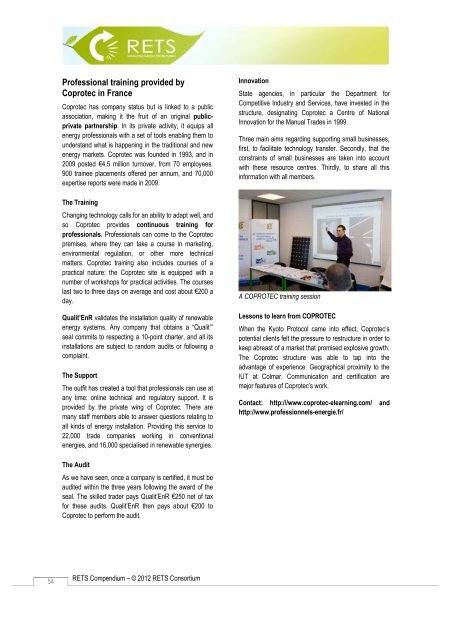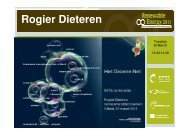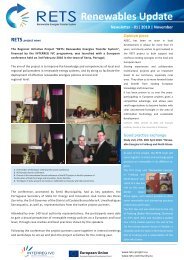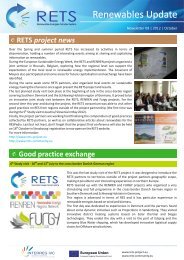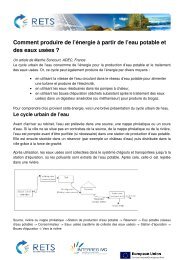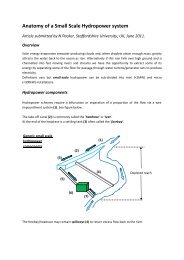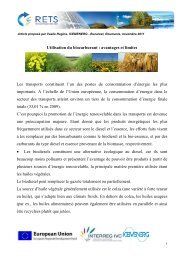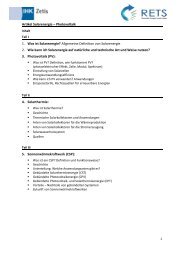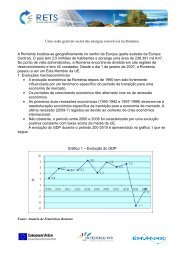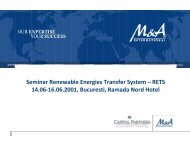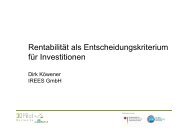Promoting renewable energies - RETS Project
Promoting renewable energies - RETS Project
Promoting renewable energies - RETS Project
Create successful ePaper yourself
Turn your PDF publications into a flip-book with our unique Google optimized e-Paper software.
Professional training provided by<br />
Coprotec in France<br />
Coprotec has company status but is linked to a public<br />
association, making it the fruit of an original publicprivate<br />
partnership. In its private activity, it equips all<br />
energy professionals with a set of tools enabling them to<br />
understand what is happening in the traditional and new<br />
energy markets. Coprotec was founded in 1993, and in<br />
2009 posted €4.5 million turnover, from 70 employees.<br />
900 trainee placements offered per annum, and 70,000<br />
expertise reports were made in 2009.<br />
The Training<br />
Changing technology calls for an ability to adapt well, and<br />
so Coprotec provides continuous training for<br />
professionals. Professionals can come to the Coprotec<br />
premises, where they can take a course in marketing,<br />
environmental regulation, or other more technical<br />
matters. Coprotec training also includes courses of a<br />
practical nature; the Coprotec site is equipped with a<br />
number of workshops for practical activities. The courses<br />
last two to three days on average and cost about €200 a<br />
day.<br />
Qualit’EnR validates the installation quality of <strong>renewable</strong><br />
energy systems. Any company that obtains a “Qualit’”<br />
seal commits to respecting a 10-point charter, and all its<br />
installations are subject to random audits or following a<br />
complaint.<br />
The Support<br />
The outfit has created a tool that professionals can use at<br />
any time: online technical and regulatory support. It is<br />
provided by the private wing of Coprotec. There are<br />
many staff members able to answer questions relating to<br />
all kinds of energy installation. Providing this service to<br />
22,000 trade companies working in conventional<br />
<strong>energies</strong>, and 16,000 specialised in <strong>renewable</strong> synergies.<br />
Innovation<br />
State agencies, in particular the Department for<br />
Competitive Industry and Services, have invested in the<br />
structure, designating Coprotec a Centre of National<br />
Innovation for the Manual Trades in 1999.<br />
Three main aims regarding supporting small businesses,<br />
first, to facilitate technology transfer. Secondly, that the<br />
constraints of small businesses are taken into account<br />
with these resource centres. Thirdly, to share all this<br />
information with all members.<br />
A COPROTEC training session<br />
Lessons to learn from COPROTEC<br />
When the Kyoto Protocol came into effect, Coprotec’s<br />
potential clients felt the pressure to restructure in order to<br />
keep abreast of a market that promised explosive growth.<br />
The Coprotec structure was able to tap into the<br />
advantage of experience. Geographical proximity to the<br />
IUT at Colmar. Communication and certification are<br />
major features of Coprotec’s work.<br />
Contact: http:///www.coprotec-elearning.com/ and<br />
http://www.professionnels-energie.fr/<br />
The Audit<br />
As we have seen, once a company is certified, it must be<br />
audited within the three years following the award of the<br />
seal. The skilled trader pays Qualit’EnR €250 net of tax<br />
for these audits. Qualit’EnR then pays about €200 to<br />
Coprotec to perform the audit.<br />
54<br />
<strong>RETS</strong> Compendium – © 2012 <strong>RETS</strong> Consortium


